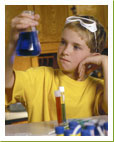|
|
  The Distillate The Distillate
|
|
|
Is Chemistry Facing a glut of Ph.D.s?
Share your thoughts and see how your peers responded by clicking on the question above.
|
|
|
|
|
VIEW FROM THE MARKETPLACE
Raising Capital - Is Your Idea Really Worth That Much?
By Mike Elconin, Tech Coast Angels
 New ideas are the source of much wealth and the lifeblood of civilization. But what are they worth to investors? The bad news - by itself, an idea isn't worth too much. One of the sad things in life is that good ideas don't always win. In fact, as every experienced investor learns the hard way, they usually don't - too expensive, too much inertia, bad development or marketing strategy to name just a few of the reasons. New ideas are the source of much wealth and the lifeblood of civilization. But what are they worth to investors? The bad news - by itself, an idea isn't worth too much. One of the sad things in life is that good ideas don't always win. In fact, as every experienced investor learns the hard way, they usually don't - too expensive, too much inertia, bad development or marketing strategy to name just a few of the reasons.
Investors buy stock, not ideas. It's a purchase with a negotiated price. The price metric is company valuation (not share price per se). As with any investment, there are two factors - return and risk. You and the investor may agree on potential return, but you will assuredly differ on risk. Until an idea has been partially de-risked, it typically has little investment value. De-risking involves some combination of an experienced management team, sustainable competitive advantage, proof it can be made and at what cost, proof of market demand, and a cost-effective path to market. You won't have all of these, but they must all be addressed to some extent before you'll find much investor interest.
Beyond that, it's almost meaningless to generalize, but I will try anyway!
For very early stage companies, an old rule of thumb is that great IP is worth $500K, great management $500K, working prototype $500K, and clear path to market $500K . By this formula, if you have nothing but a patent, your company might have a valuation in the range of $500K.
Tech Coast Angels doesn't invest in ideas (says so right on the website). That's what friends and family (and credit cards) are for. But when we see a protectable idea in a large market, at least half a management team (typically CEO and CTO), proof-of-concept, good understanding of cost, price and margin, and an attractive path to market, the company will often get a valuation of $1.5M - $2.5M, and higher for substantially less risk in any of those areas.
This view is brought to you by Mike Elconin, a seasoned entrepreneur, investor, and past president of the San Diego Tech Coast Angels. TCA is the largest network of angel investors in the U.S. You can also watch Mike's ACS Webinars presentation on Raising Capital with Angels - What They Don't Tell You at Business Schools.
Do you think you have what it takes to be an entrepreneur? Do not forget to join our ACS Webinars on April 21st with Dr. Judy Giordan to learn what it takes.
Email us marketplace topics would like us to cover in future issues.
Back to Top Page
|
|
THE BUSINESS CORNER
Middle East Uprising - Why it can Impact Your Chemistry Job
By Paul Hodges, International eChem
Events in the Middle East challenge the way chemical and pharma companies have been doing business over the past 20 years. Here's why. For the past 20 years, globalisation was a one-way bet: - Western countries relocated manufacturing operations to emerging economies. This kept costs low, and hence inflation, and sustained high levels of consumption in the West.
- Emerging economies (eg Middle East, Brazil, Russia, India, China) gained much needed employment and manufacturing know-how.
But this "win-win" is now starting to unravel.
The focus on boosting Western consumption over the past 20 years came at the expense of infrastructure investment. Financial markets rewarded 'day-trading', not long-term investment. The result is today's supply constraints, and higher prices, for many key commodities, including energy, metals and foodstuffs.
Meanwhile, in the emerging economies, the younger generation is no longer grateful just to have a job. They want a larger share of the value they are creating. So labour costs have been rising, by up to 50% in the past year in parts of China, for example.
The Middle East is currently at the epicentre of these changes. These countries have very young populations, with median ages under 30 years. Understandably, they want better standards of living. Many also want greater political freedom.
How will these changes play out over the next few years? Nobody really knows, as we have no history to guide us. We are heading towards a New Normal, which requires major innovation in technology and business models. Opportunity abounds in the emerging market, but chemical business as we know it, will have to adapt and change.
 This business insight is brought to you by Paul Hodges, Chairman of International eChem and renowned ICIS Chemicals and the Economy blogger. To read more about the New Normal, visit Paul's blog on Chemicals and the Economy. Watch ACS Webinars recording with Paul on the 2010 Chemicals and the Economy Year End Update. This business insight is brought to you by Paul Hodges, Chairman of International eChem and renowned ICIS Chemicals and the Economy blogger. To read more about the New Normal, visit Paul's blog on Chemicals and the Economy. Watch ACS Webinars recording with Paul on the 2010 Chemicals and the Economy Year End Update. Email us chemical businness topics would like us to cover in future issues. Back to Top Page |
|
CONSULTING TIP OF THE MONTH
Consultant Resumes are Different
By William Golton, Ph.D., Chemical Consultants Network
 A good résumé is probably the most important literature a consultant has to sell his or her services.In last month's article on marketing your services, I pointed out that many prospective clients would not even talk to a consultant without first seeing their résumé or another document based on it. Not only will your résumé be sent to clients, it will probably be posted on your web site, and other consultant websites, such as CCN, The CECON Group, and other places.So in addition to making a good impression on clients, it should be search engine friendly. A good résumé is probably the most important literature a consultant has to sell his or her services.In last month's article on marketing your services, I pointed out that many prospective clients would not even talk to a consultant without first seeing their résumé or another document based on it. Not only will your résumé be sent to clients, it will probably be posted on your web site, and other consultant websites, such as CCN, The CECON Group, and other places.So in addition to making a good impression on clients, it should be search engine friendly.
Before preparing your résumé, think about what you are good at, and why someone would want to hire you.Then emphasize your areas of expertise up front. Contrary to what you may have been taught in a seminar on the subject, this comes first, and don't hesitate to use the jargon and acronyms that are common in your field. After all, isn't that what a client is likely to type in a search engine when looking for someone like you? Everything that follows should help validate your claims. Also, as mentioned above, think about search strings that are likely to be used. For example, would a prospect be likely to type "medicinal chemistry consultant", "medicinal chemist", or both?
To validate your expertise, include examples of successful consulting gigs (if possible), employment positions and accomplishments, academic credentials, and perhaps a couple of publications. However the document should be fairly short. Two or three pages are fine; 20 or 30 pages are not. If you have a CV with many publications, patents, etc., you can mention it at the end as "available on request".
Last but not least, impressions and perceptions are important. Keep your résumé up-to-date with respect to contact information and recent accomplishments. And of course, use good English! Check and re-check for unclear or incomplete sentences, spelling mistakes, etc. MS Word's spelling and grammar check may be helpful in this regard.
Several good articles and templates may be found within this list of references, especially the books at the end. There is also a good article on the same site about creating a web page that is relevant to résumé writing. Some good examples of résumés (and some not so good) can be found on the websites of CCN and The CECON Group, links above.
Look for next month's article on ownership of intellectual property created by consultants.
William C. Golton, Ph.D. is with Chemical Consultants Network and a (ret.) executive at The CECON Group. This monthly tip is brought to you in collaboration with the Chemical Consultants Network. Stay tuned for next month's tip on how to create a great resume tailored for consultants.
Email us your consulting questions or tips you would like us to cover in future issues.
Back to Top Page
|
|
INSIGHTS FROM THE LAB BENCH
Networking: the human-powered job search engine
By Chemjobber, Industry Chemist and Blogger.
 What is the best way to find that job? A phenomenon in the online world in China is the "human flesh search engine". It describes using the distributed networks of Chinese Internet civil society to identify anonymous actors; for example, government officials behaving badly in public. Just like it sounds, it's the idea of using millions of pairs of eyeballs and minds (rather than computers) to do the work of finding people. What is the best way to find that job? A phenomenon in the online world in China is the "human flesh search engine". It describes using the distributed networks of Chinese Internet civil society to identify anonymous actors; for example, government officials behaving badly in public. Just like it sounds, it's the idea of using millions of pairs of eyeballs and minds (rather than computers) to do the work of finding people.
Some companies in the US have resorted to the same human powered search engine to hire new employees. Rather than spend the money to put out ads and sift through hundreds or thousands of incoming resumes, they're asking their internal employee networks to find new workers. In this way, they're allowing the networks of their employees to do the difficult (and costly) job of filtering for them. This speaks to the importance of networking to the chemistry job seeker, too. Why network and meet new people? So that you can make enough of a good impression on them that when that perfect job opening arises, you're at the top of their "search results." Good luck and good hunting. Chemjobber is a working chemist in industry; he writes a blog on employment in chemistry at chemjobber.blogspot.com. Want to improve your networking skill? Watch ACS Webinars on networking tips and strategies for scientists. Email us your thoughts or suggestions on Insights from the Lab Bench. Back to Top Page
|
| Upcoming ACS Webinars - April Lineup |
ACS Webinars™ CLICK * WATCH * LEARN * DISCUSSLearn more and register at www.acswebinars.orgTuesday April 5, 2011Successfully Working with Recruiters - Do's and Don'ts. Speakers: Patrick Ropella, The Ropella Group and Don Alexander, Carlyle & Conlan. Thursday April 7, 2011Optimizing the Workplace Across Five Generations of Scientists. Speaker: Tamara Erickson, Researcher and McKinsey Award-winning author. Thursday April 14, 2011Me Too Drugs: R&D Innovations or Imitations? Speaker: Dr. Joseph DiMasi, Tufts University. Thursday, April 21, 2011Is Being an Entrepreneur/Innovator Your Cup of Tea? Part 1 of 7 in the ACS Chemical Entrepreneurs 2011 Series. Speaker: Dr. Judith Giordan, VentureWell. Thursday, April 28, 2011Cheers! The Chemistry of Wine. Part 2 of 4 in the ACS Kitchen Chemistry 2011 Series. Speaker: Dr. Ariel Fenster, McGill University. ACS Webinars connect you with subject matter experts and global thought leaders in chemical sciences, management, and business on relevant professional issues. More information and registration...Have ideas? Email us your suggestions for future ACS Webinars topics. Please include 'Webinar Topic Suggestion' in the subject line. Back to Top Page
|
 Calling all Innovators! Would you like to spotlight your Chemical Innovations at ACS Webinars? Or know someone who would like to talk about their innovation? ACS Webinars attracted over 50,000 registrants last year. This is your opportunity to gain exposure and to show that chemistry is full of innovations. For consideration, please email us a short paragraph of your innovation and proposed presentation; use the subject title INNOVATION. Calling all Innovators! Would you like to spotlight your Chemical Innovations at ACS Webinars? Or know someone who would like to talk about their innovation? ACS Webinars attracted over 50,000 registrants last year. This is your opportunity to gain exposure and to show that chemistry is full of innovations. For consideration, please email us a short paragraph of your innovation and proposed presentation; use the subject title INNOVATION.
Back to Top Page
|
Can't attend the live ACS Webinars? To access recordings of past ACS Webinars, please visit our on-demand content library or YouTube.  Featured Archived Content: Featured Archived Content:Interested in Forensic Chemistry? Get an insight into an FBI chemistry lab and learn what happens behind the crime scene. Watch at http://acswebinars.org/schaff. Back to Top Page
|
 Recruiting Science Grads Recruiting Science Grads
The Bureau of Ocean Energy Management Regulation and Enforcement is recruiting science grads. They will be scouting students from U.S. colleges starting April 4th. The list of schools has not been finalized, but keep checking the BOEMRE website. Read the news... Back to Top Page |
 Do You Know a Hero of Chemistry? Nominate them NOW! Do You Know a Hero of Chemistry? Nominate them NOW! Each year, Heroes of Chemistry are nominated by their own companies to recognize their talent, creativity, and innovation. Previous Heroes of Chemistry have excelled in innovation at prominent international corporations and developed many commercial products that demonstrate strong financial performance. The commercial success of their products in the marketplace is an important criterion for this honor because ACS recognizes that good business results follow good science. Heroes of Chemistry will be honored at the 2011 ACS Fall National Meeting in Denver. More information can be found at www.acs.org/industry. Back to Top Page |
Upcoming meetings that may be of interest to you:
- April 7, 2011 - Growth Opportunities in Specialty Pharma Luncheon/Webcast Event, Chemical Marketing & Economics Group - ACS NY Section.
- July 18-20, 2011 - Organic Microelectronics & Optoelectronics Workshop VII, San Francisco, CA.
- June 19-22, 2011 - 85th ACS Colloid and Surfaces Symposium, Montreal, Quebec, Canada.
- Jun 21-23, 2011 - 15th Annual Green Chemistry & Engineering Conference + 5th International Conference on Green and Sustainable Chemistry, Washington, DC.
Back to Top Page |
Want your events included in The Distillate and/or ACS Webinars webpage? Please email us your events info with the subject title EVENTS.
|
International Year of Chemistry 2011 Spotlight
|
|
 Interested to hear how Nobel Laureates describe chemistry? Interested to hear how Nobel Laureates describe chemistry?
To celebrate International Year of Chemistry 2011, several videos are now available on how Nobel winners describe new frontiers in their field and explore what life as a chemist entails.
Watch the videos...
Back to Top Page
|
 Think You are Going Bananas? It's Good! Think You are Going Bananas? It's Good!A chemistry researcher from Sao Paulo, Brazil, has found a way to use banana peels to help extract heavy metal pollutants from water. This discovery promises an inexpensive and green process to solve environmental issues. Full article...Back to Top Page |
 Chemistry Fizzle is Going Strong - Sodanomics. A medicinal chemist by day, a soda entrepreneur by evening, Antonio Ramos and his wife apply his chemistry skills to create wonderful and naturally flavored soda beverages. Their soda experiment is booming and the company just hired three new employees. That's a lot of fizz in chemistry. Full article...Back to Top Page |
 Gotta Pee Again? Save That Liquid... Gotta Pee Again? Save That Liquid...
Gerrardine Botte from Ohio University found a process to procure hydrogen from urine. Based on her calculations, 200-300 people could potentially generate two kilowatts of power, and 1000 cows would generate forty to fifty kilowatts. Should I expect payment from public toilets for my contribution? Full article...Back to Top Page |
 Counterculture chemist? You decide. Counterculture chemist? You decide.
The first and foremost underground chemist of his day, Owsley Stanley, died at age 76. He was well known for manufacturing an estimated two million to five million doses of the hallucinogenic drug, which he often distributed free.
Read the full obituary...
Back to Top Page
|
 Chemistry, Biology, and Modern Languages Dropouts. Chemistry, Biology, and Modern Languages Dropouts.
Chemistry wins again. Amongst the three subjects with the highest number of dropouts, chemistry ranked number one according to a study by Cherwell at Oxford University. The reason? Chemistry is just a lot harder. No kidding!
Read the report...
Back to Top Page
|
 Win an ACS 'International Year of Chemistry 2011' lapel pin. Win an ACS 'International Year of Chemistry 2011' lapel pin.
"The great tragedy of science, the slaying of a beautiful theory by an ugly fact." by ???
Send us your correct answer to win the lapel pin. Two winners will be selected for this popular pin. This month's inspirational quote was submitted by Bill Motzer.
Email us (imp@acs.org) your answer by April 15, 2011 to be entered into the drawing. Please use QUOTE for the subject line. Answer and winners will be posted in next month's edition.
Congratulations to George Haas of Kraft Foods and Russell Rouseff of Citrus Research and Education Center - University of Florida for the correct answer. "Let us learn to dream, gentlemen, and then perhaps we shall learn the truth" by August Kekule. Winners were randomly selected from all the correct entries received and will receive an ACS lapel pin. Thank you to all who entered the contest.
Have a quote to share? Send us (imp@acs.org) your favorite scientists' quotes and if we use your submission, we will send you a surprise prize.
Back to Top Page
|
Reach >100,000 scientific professionals. If you would like to submit an article, news, or upcoming events for next month's
newsletter, email us by 5:00 pm Eastern Time on the third Friday
of the month to imp@acs.org. Inclusion is subject to space and
editorial discretion.
|
|
|
|
|
Back to Top Page
About this e-mail: You are receiving this newsletter because you are an ACS member. ACS Industry Member Programs respects your privacy and will not sell, lease, or share your e-mail address with any other organization. ACS Industry Member Programs will only use e-mail for the purpose of conducting ACS business. To update your email or to unsubscribe, please click on the links below. The views expressed in the Distillate are those of the authors and do not necessarily reflect the views or policies of the ACS.
|
|
|
|
|
|